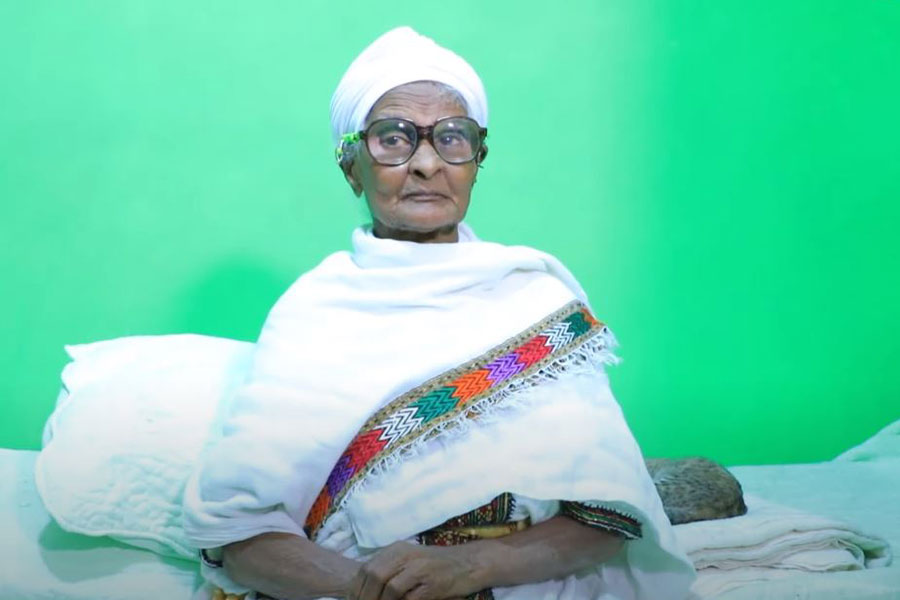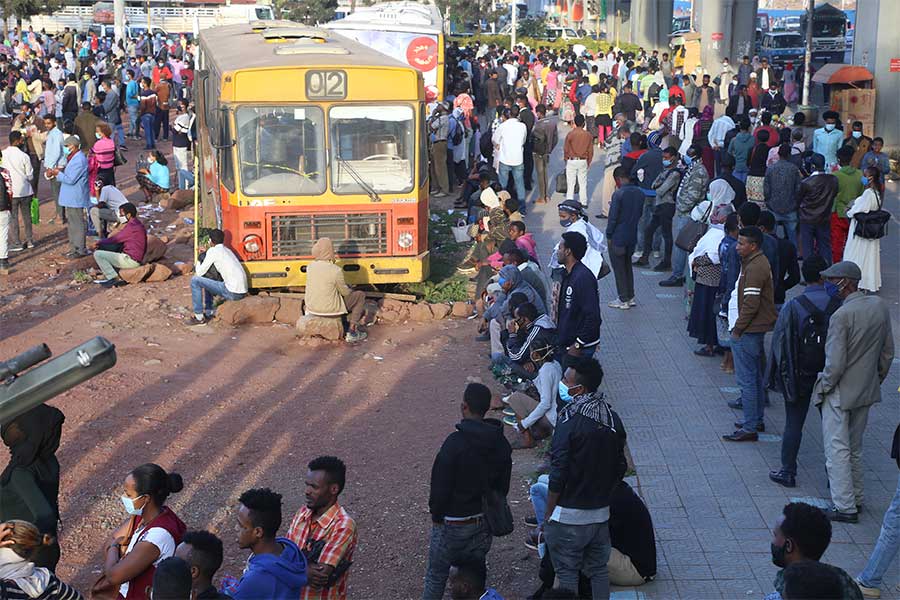
Radar | Feb 29,2020
Michael Melake, a landscape designer who works in Addis Abeba, was only 12 when the song 'We are the World' hit the airwaves across the globe.
Released to raise funds for famine victims in Ethiopia, the music was performed by 45 famous musicians including Michael Jackson, Lionel Richie and Stevie Wonder.
The event was the poster child of Bob Geldof and Midge Ure, who organised the Live Aid Concert in support of drought victims of 1985.
"The song has been engraved in me and my friends’ minds because of the images that were circulating at that time," Michael said.
Michael says that the recent pictures from Gedeo Zone that are popping up on social media have reminded him and his friends of what happened nearly 34 years ago in Ethiopia.
The issue of Gedeo became popular on social media following an article published in The Guardian and reported by Tom Gardner in March 2019.
The story of those who were pushed out of their homes and livelihoods by inter-regional disputes in Gedeo and West Guji zones has put the issue of internal displacement back on the burner. This is a devastating story of displacement and suffering of people who are left at the mercy of aid agencies in refugee camps far from their villages and homes.
"Witnessing the situation, we felt the urge to do something," Michael told Fortune.
Michael and his high school friends contributed to buy 85ql of corn, which when milled produced 83ql, and organised to send the grain to Gedeo Zone, where 40,000 victims are sheltered at six temporary campsites.
And Michael is not alone. Many others have jumped on the bandwagon to provide aid to those affected. Some launched their campaigns on social media platforms, while others began collecting money through GoFundMe accounts.
On the GoFundMe website, over 13 accounts have been created that solicit donations in support of Gedeo Zone victims.
As of Mid-April, approximately 1.4 million dollars has been raised, of which 1.3 million was sent to the Global Alliance for the Rights of Ethiopians, a charity chaired by well-known artist and activist Tamagne Beyene.
Food aid from Care & Share being unloaded at a campsite in Gedeo Zone for the displaces by voluntary youth from Dilla City.
Several individuals have also tried to use Facebook and Twitter to raise funds for Ethiopians displaced in different parts of the country.
In the past two years, the number of people who require immediate food and non-food assistance has soared, fueled by the growing number of inter-communal disputes.
A January 2019 assessment made by a federal command post established by the Disaster Risk Management Commission (NDRMC), which serves under the Ministry of Peace, show that there are at least 2.9 million internally displaced people in the country.
Two-thirds of the 1.4 million people who were forced from their homes in 2018 were fleeing inter-communal violence, according to a report by the EU’s Directorate for Civil Protection and Humanitarian Aid Operations.
The government institution responsible for providing aid and support to those affected by natural or man-made disasters is NDRMC. The Commission gets its funding from the government, international partners and from charitable organisations and individuals.
In early March of this year, the Ethiopian Government announced that 1.3 billion dollars is needed to help 8.3 million Ethiopians who require food and non-food assistance.
Thus far, 29pc of the total funding has been secured, including 149.6 million dollars carried over from 2018; 176.7 million dollars in government pledges; and 48.9 million dollars in international donor funding, according to United Nations Office for the Coordination of Humanitarian Affairs (UNOCHA) report on Ethiopia for the first half of April.
Solomon Mengesha, an electronics shop owner around Dembel City Center in the capital, is another concerned citizen collecting funds to assist these displaced people. He has been leading a campaign, Care & Share, on Facebook for the past four years.
His initiative has provided clothing, blankets and plastic tarps that they pass along to street children in Addis Abeba. Care & Share also has a back-to-school project for students all over the country. Last September his initiative provided a dozen notebooks to 2,500 students in several parts of Ethiopia.
Around the time when the public’s attention turned to the internally displaced people in Gedeo, Solomon posted a request for funds on Care & Share’s Facebook account.
Michael is one of the individuals who responded to Solomon's call.
Within a week the campaign collected 150ql of wheat flour, six cartons of oil, 83ql of corn flour and other food and clothing items that were sent to Gedeb Woredain Gedeo.
After the aid reached Gedeo Zone, members of Dilla University’s charity club and a group of volunteer youth from the city of Dilla distributed the aid to displaced people in Cheleleqtu, Gedeb Woreda, Qore and Gotiti kebeles.
Once the aid had been distributed, youth volunteers from Dilla compiled a list and sent it to Care & Share where it was posted online to let everyone see that their contributions have reached the intended victims.
When the aid sent by Solomon’s team reached the charity club in Dilla, it identified the campsites where the aid will go and determined the number of people who will receive the aid, according to Binyam Shiferaw, a management staff member at Dilla University and one of the organisers of the charity club.
“We don’t store the aid in a warehouse and wait for officials to sign off on the distribution," said Binyam. "We just distribute it right away.”
Yared Shumete, an Ethiopian actor, is another person who is using his influence to support the needy. Through his Facebook page, he has been collecting donations to aid those who were evicted from their homes in Legetafo, in the outskirts of Addis Abeba, as a result of recent conflicts.
The Legetafo town administration has dismantled 3,685 homes deemed illegal and left thousands of residents and their families homeless.
Even though his campaign had been able to collect large amounts of food, finding transportation to deliver the aid has proven to be a challenge.
When he shared this issue online, several people offered their help and the aid was transported and delivered within four days from Hager Fikir Theatre, where it was being stored.
Last July, at the height of internal displacement incidents, Yellow Movement, an eight-year-old organisation formed by lecturers and students of Addis Abeba University's School of Law, started a campaign to collect food and clothing for the affected people.
Even though the movement is primarily dedicated to creating discussions on gender-based violence and women's empowerment, it decided to get involved in internal displacement issues for the first time.
Using the public trust the movement has garnered over the years, the organisation decide to foray into helping the internally displaced, according to Meraf Admasu, a fourth-year law student and a member of Yellow Movement for four years.
“In our first round of campaigns, we were able to collect clothing and sanitary and kitchen supplies,” she said.
During their second campaign, which started in early April, they collected food items, clothing and more sanitary supplies, along with 4,770 euros raised through a GoFundMe account.
They gathered everything they collected and handed it over to Care & Share, because it could transport the collection and use the money raised to purchase more food items, according to Meraf.
Though there is a government institution formed to handle issues of displaced people, these social media-based campaigns prefer to collect, transport and distribute the donations themselves, independent from the government.
Officials at NDRMC appreciate the initiatives of these volunteers to raise funds, though they believe that the support should be channeled through the Commission.
From a humanitarian point of view, such campaigns are welcomed, as people cannot just watch people suffering, according to Yonas Tesfa (PhD), a law and development expert.
“But it is difficult to regulate them, as they don’t fit into any legal framework,” Yonas added.
Yonas believes that the government can still check on the work they are doing and ask them to present an audit report showing that the collected items from the public are delivered to the beneficiaries.
“And if the campaigns can’t prove the legitimacy of their work, it should be held accountable,” he added.
The recently legislated Civil Society Organizations (CSO) proclamation also supports the formation of such fundraisers and "charitable endowment committees".
If they fit under a specific legal framework, they will have to get audited and prepare a report on their work, which makes them more accountable and transparent, according to the proclamation.
PUBLISHED ON
Apr 26,2019 [ VOL
20 , NO
991]

Radar | Feb 29,2020

Viewpoints | Jul 09,2022

Editorial | Dec 25,2021

View From Arada | Nov 07,2020

Radar | Jan 22,2022

Commentaries | Aug 07,2021

Radar | Jan 03,2021

Sponsored Contents | Aug 22,2022

Agenda | May 16,2020

Viewpoints | Oct 09,2021

Dec 22 , 2024 . By TIZITA SHEWAFERAW
Charged with transforming colossal state-owned enterprises into modern and competitiv...

Aug 18 , 2024 . By AKSAH ITALO
Although predictable Yonas Zerihun's job in the ride-hailing service is not immune to...

Jul 28 , 2024 . By TIZITA SHEWAFERAW
Unhabitual, perhaps too many, Samuel Gebreyohannes, 38, used to occasionally enjoy a couple of beers at breakfast. However, he recently swit...

Jul 13 , 2024 . By AKSAH ITALO
Investors who rely on tractors, trucks, and field vehicles for commuting, transporting commodities, and f...

Oct 4 , 2025
Eyob Tekalegn (PhD) had been in the Governor's chair for only weeks when, on Septembe...

Sep 27 , 2025
Four years into an experiment with “shock therapy” in education, the national moo...

Sep 20 , 2025
Getachew Reda's return to the national stage was always going to stir attention. Once...

Sep 13 , 2025
At its launch in Nairobi two years ago, the Africa Climate Summit was billed as the f...